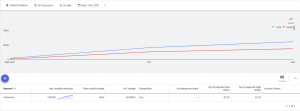When Mark Zuckerberg announced at the end of October last year, that Facebook would be re-branding its holding company to ‘Meta Platforms’, a new dawn of technology was ushered in.
In the UK alone, the average monthly searches of the keyword ‘metaverse’ between September to November last year spiked from 18,000 to 246,000. This statement of intent from Zuckerberg to be a prime mover in the next phase of the internet has resulted in marketing departments all around the globe asking the same question – ‘Should we be on the metaverse?’

In the months that followed Zuckerberg’s announcement, global giants have begun making moves to expand their metaverse presence. Nike acquired RTFKT, a business that develops digital goods such as virtual trainers, whilst in December Ralph Lauren opened its newest store, not in London or Manchester, but on Roblox, an online global platform that brings people together through play. Similarly, the likes of Gucci, Balenciaga and Burberry are already making millions through creating fashion and accessories that’ll never be physically worn.
As Steve Barrett mentioned in PR Week, brands must go where the audiences are. And as a caveat to that, brands that don’t go where the audiences are, risk no longer being able to engage with both new and existing audiences. With that in mind, don’t be surprised if we continue to see an influx of businesses across both B2B and B2C sectors deciding to take the (virtual) leap and launch on the metaverse.
But what marketing strategies can brands and corporates alike undertake to make sure they are maximising awareness of not only their transition to the metaverse but also when they launch on the platform?
Influencer Marketing
The metaverse and influencer marketing in theory should be a match made in heaven. What better way for a travel brand such as Secret Escapes to showcase the exclusivity of their getaways than by having a travel influencer share genuine personal experiences on the trip with followers of the brand. Or by having a celebrity chef take over a restaurant for a night and giving engaged audiences the opportunity to watch a professional up close and personal.
Businesses that are considering launching on the metaverse should think about which influencers align best with their brand, how they could deliver campaigns that will drive the best possible ROI, and ultimately will engage their audience accordingly.
Creative use of PR
With the metaverse still in its infancy, it’s a topic that still consumes a large section of the media on a daily basis, meaning there is ample opportunity for brands to take advantage and position themselves as a business leading the way for others in their industry through a concerted PR effort.
Importantly, brands need to also be clear about how any expansion into the metaverse will enhance their product or service. While there is plenty of hype surrounding the metaverse, companies who jump on the bandwagon could actually undermine their position in the market. Businesses need to identify how the metaverse could enhance their product or service, rather than making bold claims about their expansion into the sector.
For metaverse companies that already exist, PR is warranted to stand out from the competition. Whether it be appealing to investors interested in backing metaverse companies or demonstrating to business audience how the metaverse can support remote working in a post-pandemic era, PR will be key to the scale-up of these businesses.
From creating captivating content such as inviting journalists to attend press events on the metaverse, pitching out comments from your internal ‘Chief Metaverse Officer’, or partnering with creators already in the space are all newsworthy opportunities.
If you would like to discuss how our expertise could help prepare your brand for launching on the metaverse, get in touch today.